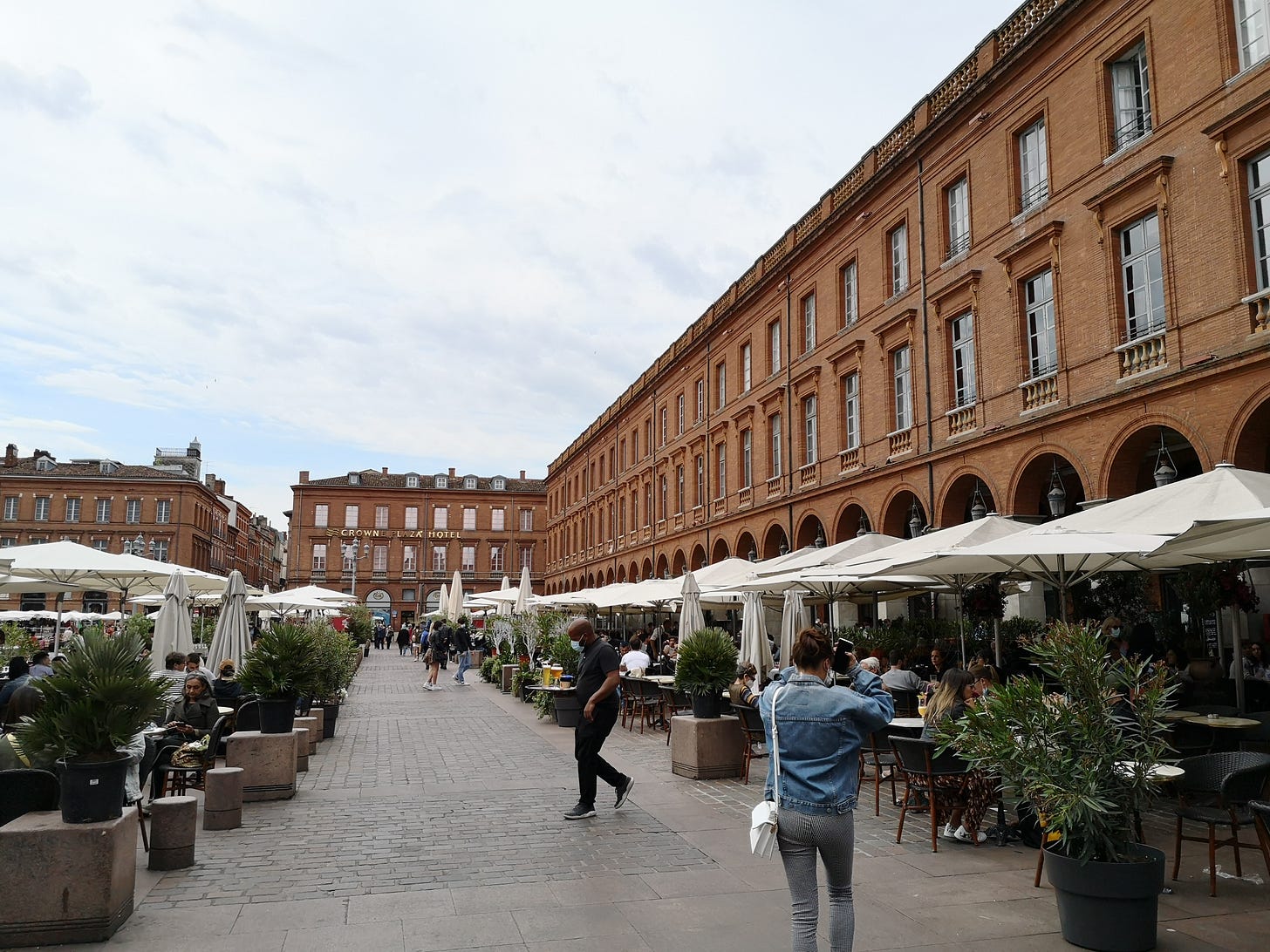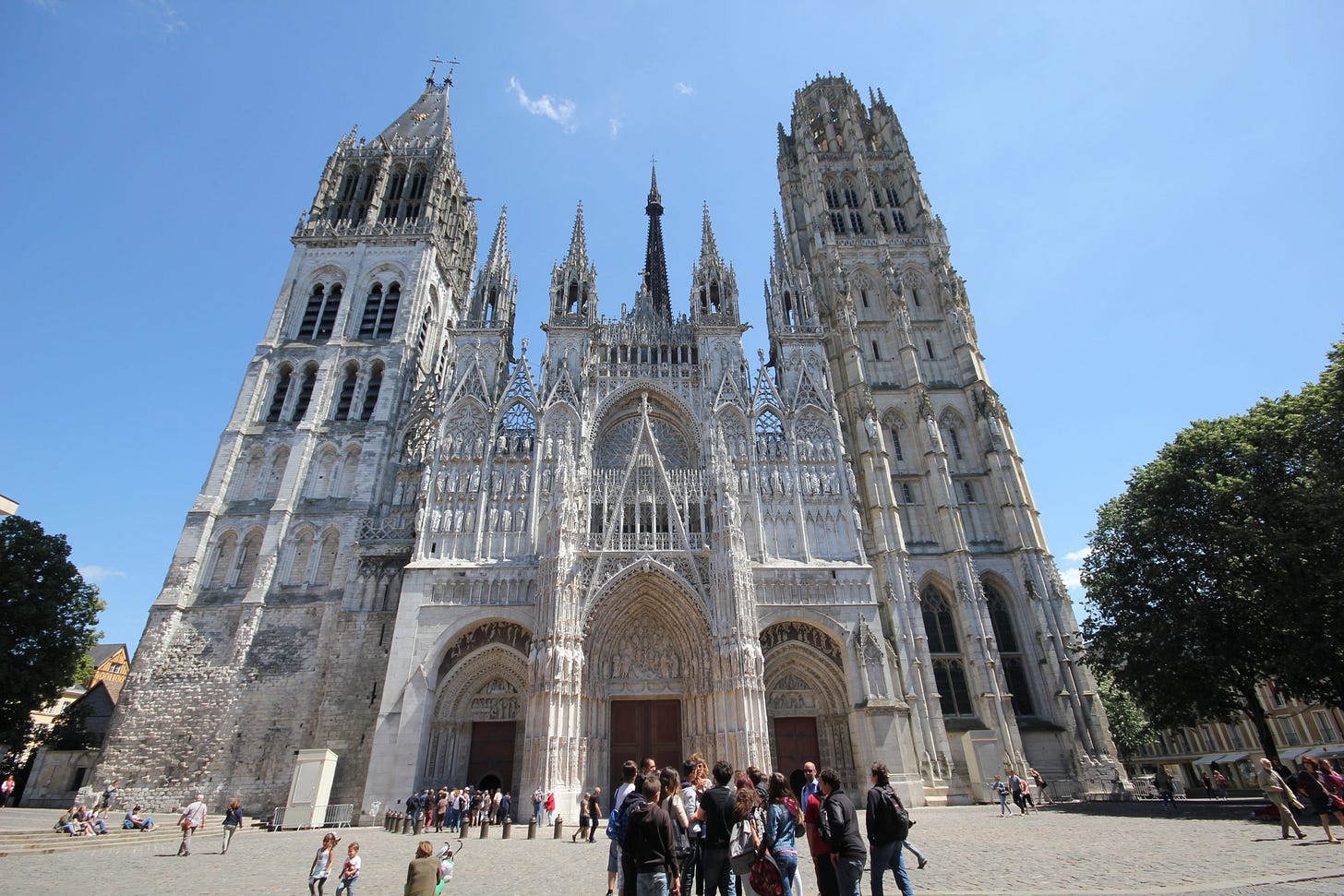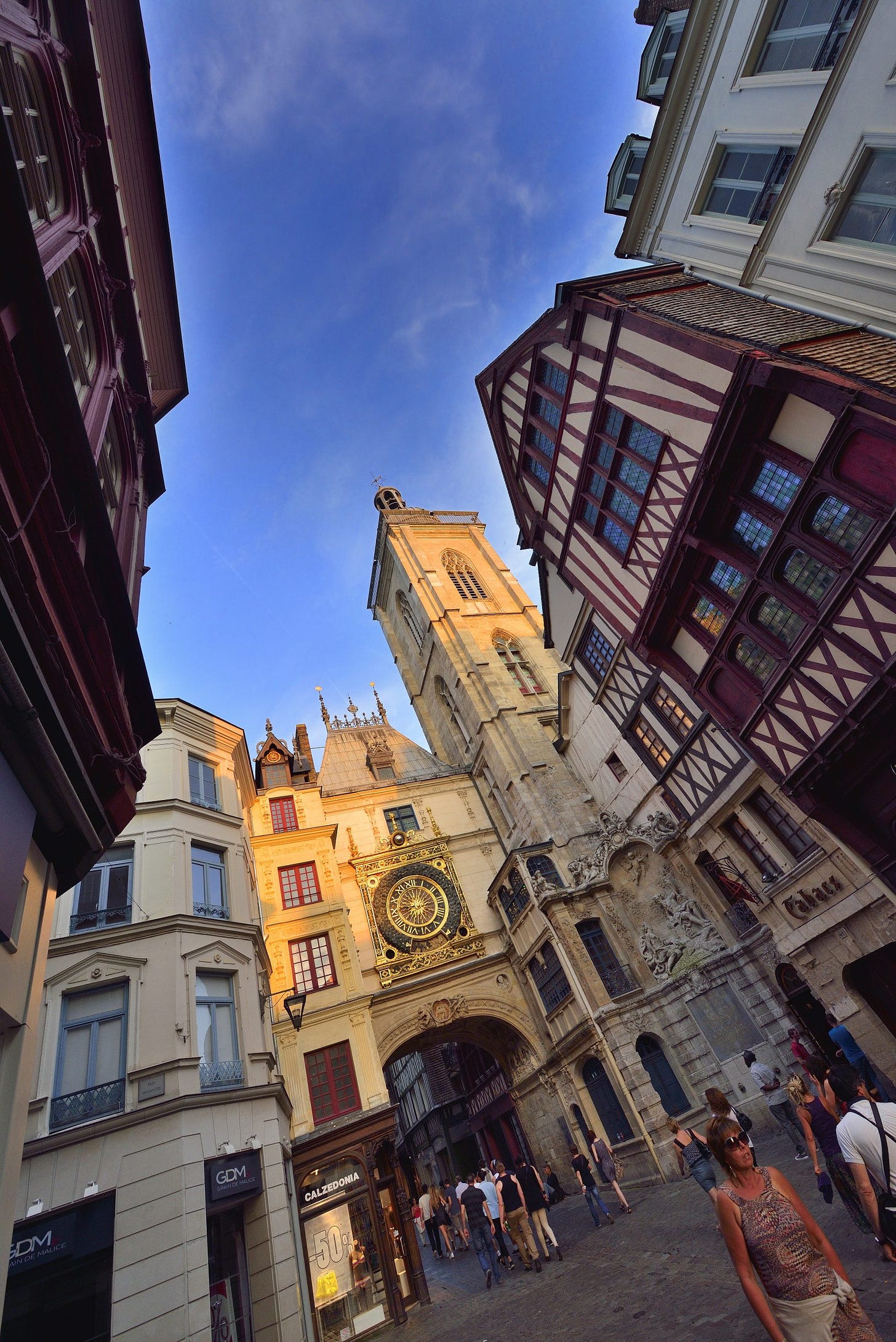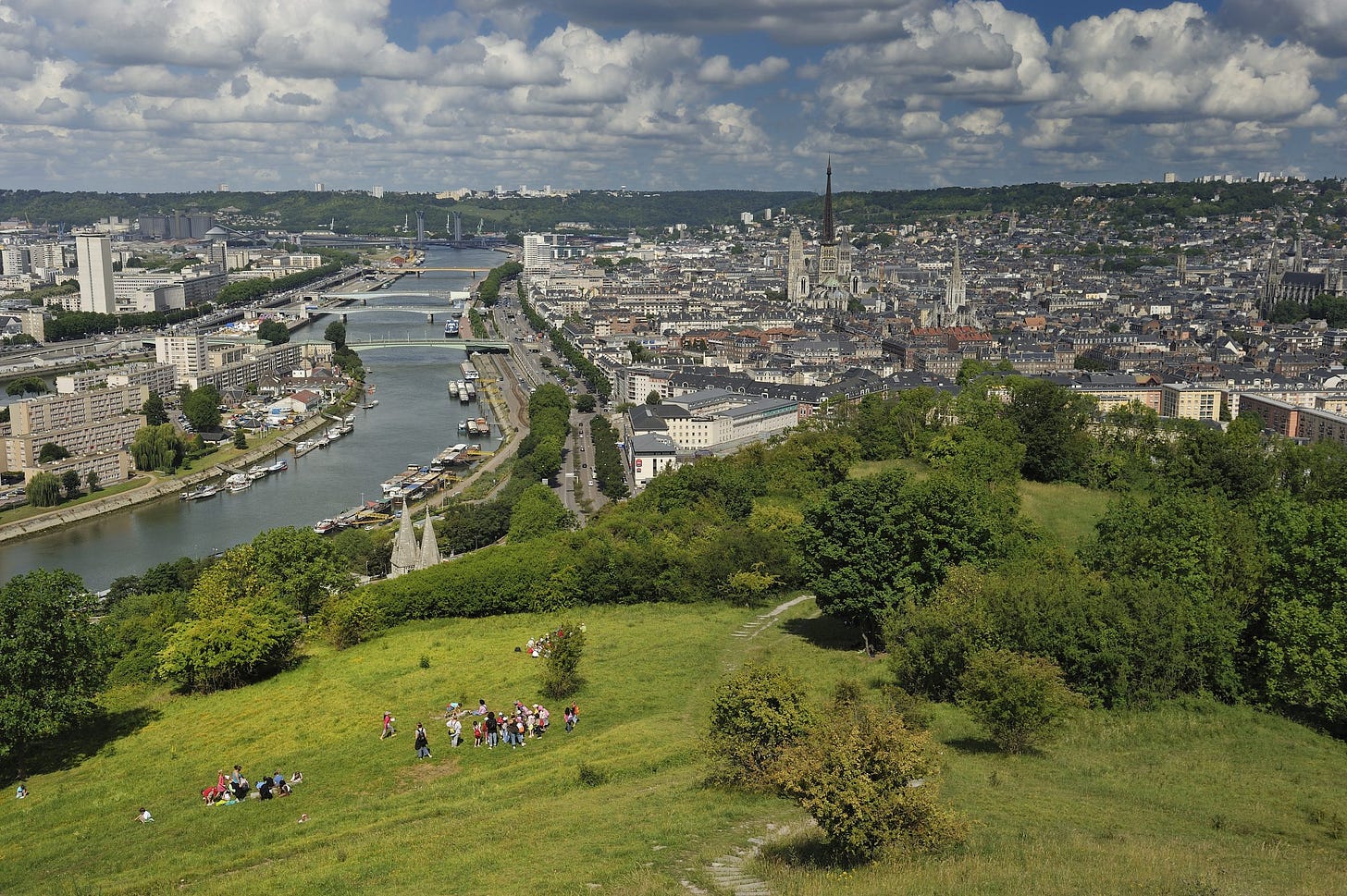Once Upon A Time In France: New Beginnings, Political Improprieties, And Eurovision Euphoria
Dreaming Of Rouen
While the U.S. is lurching toward re-opening, France’s emergence from its third lockdown happened like a bang last week. It’s a phenomenon that reflects just how centralized the state is compared to the U.S., where various states and counties are taking their own steps toward normalcy, making for an uneven pace.
In fact, last Wednesday in France felt like a national holiday as residents were again allowed to visit bars, restaurants, and movie theaters which re-opened for the first time since last fall. For now, bars and restaurants are limited to terrace seating. But that will change next month, assuming Covid case rates don’t explode.
Walking around Toulouse, the city seemed like it had suddenly blossomed. In fact, this happens every year. A band of hardy smokers brave the terraces of restaurants in the Winter and early Spring. And then suddenly, when the sun returns around March or April, the sidewalks are packed again and the city vibrates with life. Of course, we missed that last Spring as the country went into lockdown for two months.
Now, many restaurants that took reservations reported being fully booked for the next several weeks. And many would-be moviegoers also reported difficulty in finding tickets at cinemas which still face restrictions on seating and attendance.
This jubilation prompted a slew of government officials to engage in a kind of fetish-y photo op in which they appeared to be behaving like regular folks enjoying the typical stuff regular folks do when the country re-opens. Everyone has their kinks, I suppose.
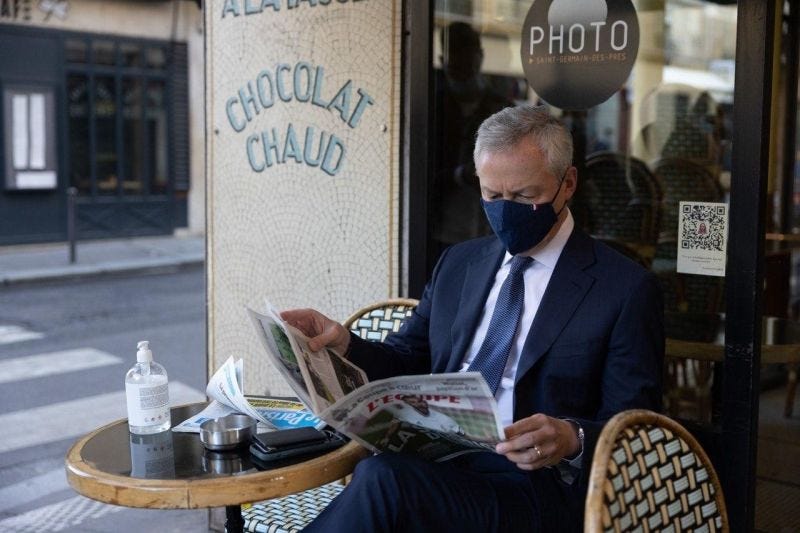
That included the president and prime minister.
There is all part of a weird and growing optimism in the country at the moment. This is in part driven by a surge in vaccinations.
And it creates an interesting dynamic compared to where things stood just a few weeks ago. When I arrived in the U.S. in early April, the nation was leading the international vaccination drive and had a lot to crow about. But it quickly hit a plateau and now seems to be struggling to convince large segments of the country to get vaccinated.
In contrast, late last year France seemed to be headed toward trouble with a December poll showing as many as 61% of the French indicating they would not get vaccinated. But as the vaccines have rolled out, that number has fallen sharply.
People are now counting the days until June 9, when the 9 p.m. curfew will be pushed back to 11 p.m. and non-EU tourists will be allowed back into the country.
Meanwhile, President Macron is enjoying a rise in polls with 42% having a favorable opinion of him and 65% happy about the de-confinement strategy, according to Le Figaro. Macron is going on a post-lockdown listening tour around the country to hear what people have to say, but also to no doubt to remind them of his accomplishments as the 2022 election inches closer.
How will the French handle so much good news? It could make for confusing times.
Political Improprieties
Speaking of French presidents, ex-head of state Nicolas Sarkozy was back in court last week on campaign finance fraud charges. Prosecutors claim he was part of a group that created a phony billing system to boost his 2012 re-election bid (which he lost to François Hollande). Cheating is bad. Cheating and still losing? Even worse. Back in March, Sarkozy was found guilty on other corruption charges and sentenced to 3 years in prison (though is unlikely to serve any time).
Meanwhile, a 5-year investigation concluded that future presidential wannabe Marine Le Pen and her political party had set up a “fraudulent organized system of misappropriation of European funds for its benefit, through fictitious jobs as parliamentary assistants ”. The scheme was allegedly set up following her party’s success in European Parliament elections. This potentially opens up Le Pen to prosecution for embezzlement of public funds, organized fraud, and attempting to cover it up.
As is the way these days, Le Pen dismissed it all as fake news. More precisely, on Twitter, she accused the newspaper that published the report of being “an official organ of Macronist power” and otherwise said: “Nothing new under the sun, except maybe some good polls in sight?”
Eurovision Euphoria
I continue to be amazed that Eurovision has not become a thing in the U.S. Nevertheless, I have become a full convert to the kitsch-y awfulness of the performers, the garish costumes, and the impossibly convoluted voting system. (And let’s not even stop to ponder how countries like Australia are included in a European contest.)
However the voting system actually works, it annually dooms France’s chances. And so each year, I listen to the French hosts complain about the injustice of it all and groan about the vast conspiracy that sinks its contestant. But this year, to my shock, France’s Barbara Pravi came darn close to winning.
French pop music is a sad affair, but Pravi drew from its stronger well of popular jazz to write and perform, “Voilà.” That prompted comparisons to Edith Piaf of Non, je ne regrette rien fame, for better and for worse.
Still, Pravi seemed to have a shot at winning after the first round of professional jury voting, but an Italian metal band overpowered her in the popular vote leaving her in second place. Still, it was nice to see that she left behind the overdone theatrics embraced by most performers for a simple, classic approach that leaned more on her talent than fireworks.
Dreaming Of France
The city of Rouen in Normandy straddles the Seine River. At its center stands the Cathedral Notre Dame of Rouen, a masterpiece of Gothic art that is far larger than its cousin in Paris. Historically, the city was the English capital of Normandy and also where Joan of Arc was tried and then burned alive. On a more upbeat note, the city center is a delight of Medieval architecture that also includes an astronomical clock.
The city has a wealth of museums, including the Musée des Beaux-Arts which has a wonderful collection of Impressionist art. Or head outside to stroll through the Jardin des Plantes which is 85,000 square meters or wander the banks of the Seine.
Great Reads
The Associated Press has a good summary of a rather bizarre campaign stop Macron made on a YouTube channel with a couple of pranksters. He participated in a contest in which each side tells a story and the other has to guess whether it was true or false. The contest ended in a tie.
The New York Times’ Roger Cohen caught up with Corinne Rey, who was forced by gunmen to open the Charlie Hebdo offices so they could attack the staff in 2015:
In her recently published graphic novel, “To Draw Again,” Ms. Rey, 38, portrays herself as a small, trembling figure being tracked up the stairs by two immense featureless shapes whose weapons bear down on her. “That is how I saw them,” she said in a recent interview in Paris. “Monsters, dressed in black, huge, with no human trait.”
Jon Henley visited Paris’ Musée Carnavalet which reopens this month a 5-year renovation that cost €58 million. The Local looks at a controversial plan to deal with a crack problem in one Paris neighborhood. And finally, the AFP explores the fight between bottled water giant Volvic and locals who have accused the company of causing water shortages across the region:
Laurent Campos-Hugueney, a farmer and member of the Water is a Public Good collective, said streams around Volvic no longer flow strongly enough to support irrigation.
"There hasn't been any plant or vegetable operations in the area for several years," he said.
Chris O’Brien
Toulouse, France


